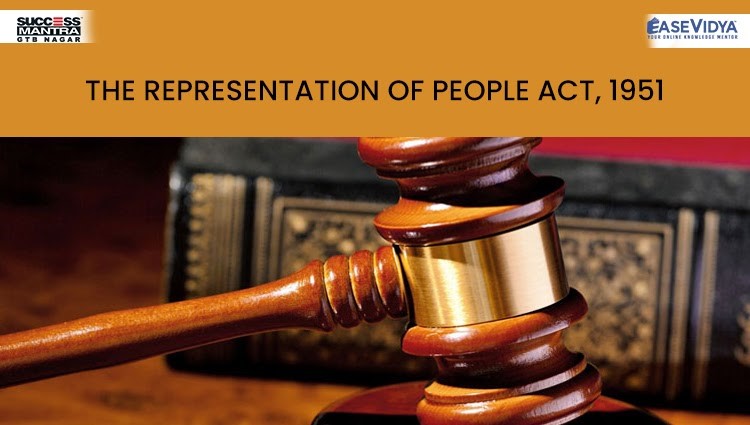
THE REPRESENTATION OF PEOPLE ACT 1951
THE REPRESENTATION OF PEOPLE ACT, 1951
- The RP Act, 1951 is of special significance to the smooth functioning of Indian democracy, as it checks the entry of persons with criminal background into the representative bodies. RP act, 1951 was amended many times, the major amendment being made in 1966.
- The original RPA 1951 contains 13 parts and 171 sections. Part 2 deals with qualifications and disqualifications of the members of the parliament and the state legislatures. Part 4A deals with the registration of political parties. Part 5A deals with the free supply of certain materials to candidates of recognised political parties. Part 13A mentions the Chief Electoral Officer.
- This act is important because it is cited by judges frequently in preventing criminals from entering the electoral system and representative bodies of the country.
Salient features of the Representation of People Act 1951
- Conduct of elections of the Houses of Parliament and to the House or Houses of the Legislature of each State.
- Details about the structure of administrative machinery for the conduct of elections
- Qualifications and disqualifications for membership of those Houses
- Corrupt practices and other offences at or in connection with such elections
- The decision of doubts and disputes arising out of or in connection with such elections.
- By-elections to the vacant seats.
- Registration of political parties
Qualification for membership of the Lok Sabha: According to the act, a person shall not be qualified to be chosen to fill a seat in the Lok Sabha unless:
- He is a member of any Scheduled Caste of any state and is an elector for any Parliamentary constituency; in the case of a seat reserved for the Scheduled Castes in any State.
- He is a member of any Scheduled Tribe of any state and is an elector for any Parliamentary constituency in the case of a seat reserved for the Scheduled Tribes.
- He is an elector for any Parliamentary constituency; in case of any other seat.
Qualification for membership of the Rajya Sabha: A person shall not be qualified to be chosen as a representative of any State or Union territory in the Rajya Sabha unless he is an elector for a Parliamentary constituency.
Disqualification: Also, a person can be disqualified on various grounds. E.g.: corrupt practices, office of profit, person convicted of any offence and sentenced to imprisonment for not less than two years etc.
Election expenses: According to the section 77 of RPA, 1951, every candidate contesting in election to the House of the People or to the Legislative Assembly of a State, shall, either by himself or by his election agent, keep a separate and correct account of all expenditure in connection with the election incurred or authorized by him or by his election agent.
Corrupt practices: Section 123 defines the corrupt practices like bribery, undue influence, inciting religious sentiments, booth capturing etc.
Election disputes: The Representation of the People (Amendment) Act, 1966 abolished the election tribunals. It transferred the election petitions to the High Courts whose orders can be appealed to the Supreme Court. However, election disputes regarding the election of President and Vice-President are directly heard by the Supreme Court.













okjyqyzzis
Latest News on Education & LAW Exams Blogs | Success Mantra <a href="http://www.gsu1dr1980253cyjo4jyd236ee83z4c7s.org/">aokjyqyzzis</a> [url=http://www.gsu1dr1980253cyjo4jyd236ee83z4c7s.org/]uokjyqyzzis[/url] okjyqyzzis http://www.gsu1dr1980253cyjo4jyd236ee83z4c7s.org/